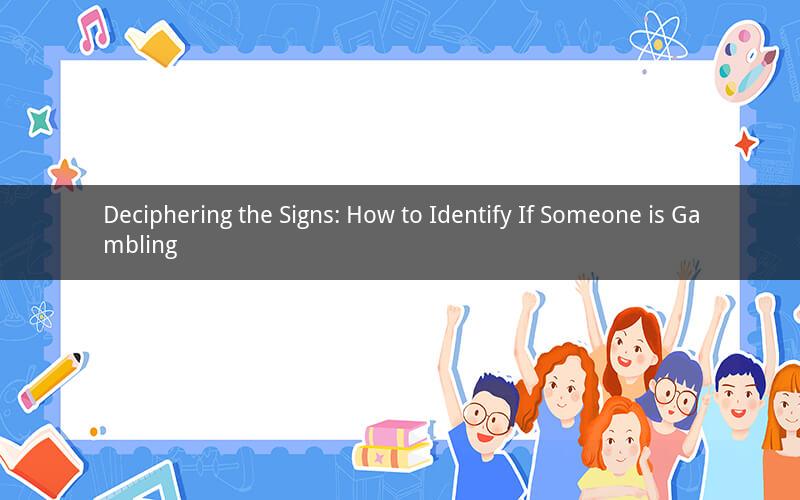
In today's fast-paced world, gambling has become a prevalent issue affecting many individuals. Whether it's online or in person, the allure of the thrill and potential winnings can be irresistible. However, it's crucial to recognize the signs that someone might be struggling with a gambling addiction. In this article, we will explore various indicators that can help you determine if someone you know is gambling.
1. Sudden Changes in Appearance and Hygiene
One of the most noticeable signs of a gambling problem is a sudden decline in appearance and personal hygiene. If you notice that someone you know has started neglecting their appearance, such as wearing dirty clothes or not showering regularly, it could be a sign that they are preoccupied with gambling.
2. Financial Troubles
Gambling addiction often leads to significant financial difficulties. Look out for signs of financial stress, such as unpaid bills, missing payments, or frequent borrowing from friends and family. If someone is constantly asking for money or seems unable to manage their finances, it could be due to a gambling addiction.
3. Behavioral Changes
Changes in behavior can be a telltale sign of a gambling problem. Pay attention to the following behaviors:
a. Spending more time alone: If someone is frequently spending time alone, it could be because they are hiding their gambling activities.
b. Secretive behavior: Hiding gambling activities is a common sign of addiction. Look out for signs of secrecy, such as avoiding eye contact or being evasive when asked about their whereabouts.
c. Withdrawal from friends and family: Someone struggling with a gambling addiction may start to withdraw from their loved ones, as they may feel ashamed or embarrassed about their problem.
4. Emotional and Mental Health Issues
Gambling addiction can take a toll on a person's emotional and mental well-being. Look out for the following signs:
a. Increased irritability or mood swings: Emotional instability is common among individuals with gambling problems.
b. Depression: The constant stress and financial strain caused by gambling can lead to depression.
c. Anxiety: The fear of losing everything can cause anxiety and panic attacks.
5. Legal Issues
Gambling addiction can lead to legal problems, such as theft, fraud, or embezzlement. If someone you know is facing legal troubles, it could be due to their gambling addiction.
6. Obsession with Winning
An individual with a gambling addiction may become obsessed with winning back lost money or achieving a big win. This obsession can manifest in various ways, such as:
a. Excessive time spent gambling: If someone is constantly thinking about or engaging in gambling activities, it could be a sign of addiction.
b. Increasing stakes: As individuals lose more money, they may start to increase their stakes in an attempt to win back what they've lost.
c. Lying about gambling activities: If someone is lying about their gambling habits, it could be because they are ashamed or afraid of being caught.
Questions and Answers:
1. Q: How can I approach someone I suspect has a gambling problem?
A: When approaching someone you suspect has a gambling problem, it's essential to be supportive and non-judgmental. Start by expressing your concern and offering help. Avoid confronting them with accusations or anger, as this may make them defensive.
2. Q: What should I do if I discover someone is gambling?
A: If you discover someone is gambling, the first step is to have an open and honest conversation with them. Discuss your concerns and offer support. Encourage them to seek professional help from a therapist or counselor specializing in gambling addiction.
3. Q: How can I help someone with a gambling addiction?
A: To help someone with a gambling addiction, you can:
a. Offer emotional support: Be there for them during their recovery journey.
b. Encourage professional help: Encourage them to seek therapy or counseling.
c. Help them create a support system: Encourage them to connect with others who have overcome gambling addiction.
d. Educate yourself: Learn more about gambling addiction to better understand the challenges your loved one is facing.
4. Q: Can a gambling addiction be cured?
A: While there is no quick fix for a gambling addiction, it is possible to overcome it with the right support and treatment. Recovery is a long-term process that requires dedication and commitment.
5. Q: What are the long-term effects of a gambling addiction?
A: The long-term effects of a gambling addiction can be severe, including:
a. Financial ruin: Gambling addiction can lead to significant financial losses, which can result in homelessness or bankruptcy.
b. Relationship problems: The stress and financial strain caused by gambling can strain relationships with family and friends.
c. Mental health issues: Gambling addiction can lead to depression, anxiety, and other mental health problems.
d. Legal problems: The pursuit of gambling can lead to legal issues, such as theft, fraud, or embezzlement.
In conclusion, recognizing the signs of a gambling addiction is crucial in helping someone you care about. By being aware of the potential indicators and offering support, you can help them on their path to recovery.